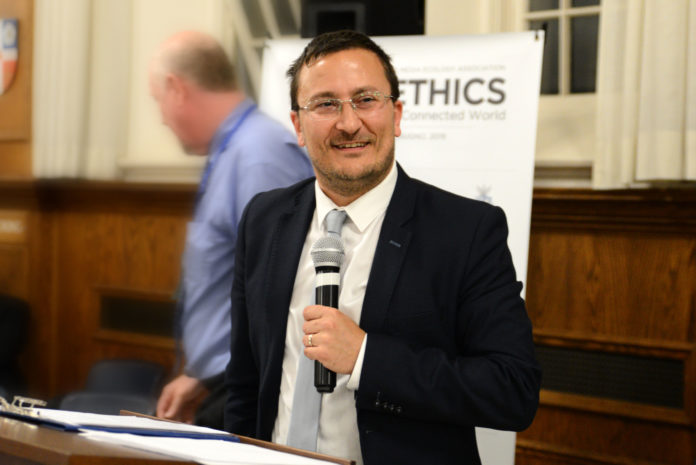With the city as its classroom, a new Media Ethics Lab at the University of St. Michael’s College will help students respond to the ethical issues being raised by rapidly emerging technologies and new communications practices.
The project is spearheaded by Dr. Paolo Granata, an assistant professor in St. Michael’s Book and Media Studies program. The lab springs naturally from an international conference Dr. Granata chaired earlier this year on the University of Toronto campus in his capacity as the vice-president of the Media Ecology Association (MEA). The conference, Media Ethics: Human Ecology in a Connected World, had a goal of exploring new ethical perspectives and frameworks to help build a digital ecosystem that will serve society in healthy and productive ways.
Popularized by Neil Postman, the phrase media ecology is based on the work of Marshall McLuhan. For those unfamiliar with the term, the MEA’s website defines it as “the idea that technology and techniques, modes of information and codes of communication play a leading role in human affairs.”
The Media Ethics Lab, explains Dr. Granata, is built upon open research, allowing a diverse, collaborative body of stakeholders, from students to media activists and organizations, to freely share information on academic programs and research initiatives to foster ethical thinking in research, learning, and civic engagement.
He views the virtual Media Ethics Lab as both an intellectual and social space where interested parties can gather to study and discuss the ways in which digital culture impacts today’s society. He sees it as a sort of clearinghouse to help society stay ahead of the curve of emerging technologies and the ethical issues that can come with them.
For now, the lab will focus on three core areas: Digital Equity, or creating equitable, inclusive communities for all; the Digital City, focussed on designing people-centered information systems; and Digital Literacy, looking at helping communities develop skills to carry them forward into the 21st century.
“Private companies rule our digital world,” says Dr. Granata. “If public policy is too slow, then the market will come first,” regardless of the impact new technologies have on ethical issues relating to matters such as privacy or artificial intelligence.
“The Media Ethics Lab is being started not only as a research project but also as an opportunity for experiential learning,”
he adds, noting that some of the lab’s funding comes from the Advancing Teaching & Learning in Arts and Science (ATLAS) program at the University of Toronto.
And this is where the “city as classroom” idea, another McLuhan concept, will come into play. Experiential learning, explains Dr. Granata, means stepping outside of the confines of the university and into the community.
“Everything we do must be able to support, foster and advance and open an inclusive society, as we must not only work towards a healthier digital world, but a more equitable planet” and that requires students getting involved in civic engagement to listening to what a broad range of people think.
He cites as an example a recent workshop students participated in at Mozilla Foundation in Toronto, a global non-profit dedicated to keeping the Internet a global public resource that is open and accessible to all. Students were invited to provide suggestions and proposals, an empowering experience that allowed them to test-drive their ideas, giving the theoretical a practical turn.
Another form of engagement via the Media Ethics Lab will be periodic charrette sessions, a type of intensive brainstorming meetings where various stakeholders gather for respectful discussion identifying both the benefits and challenges of the current digital media landscape, all with an eye to making improvements.
“We want to foster and support positive change. All of the Media Ethics Lab’s efforts are also are done in support of the UN’s sustainable development goals.” Dr. Granata says.
Several students have already been involved, either in the conference end of this project, or now by on establishing the lab, including Kelsey Mcgillis, Alexandra Katz, and David Lee, all Book & Media Studies students at St. Mike’s as well as Robert Bertuzzi, PhD candidate at Western University, and Simon Digby, recently graduated at British Columbia’s Quest University.
Going forward, the lab will provide both training and mentorship to the students, encouraging them to participate in academic discussion and debate, necessary skills to carry forward if they are to help shape future policy or plan to teach.
Training and mentoring will be provided by Dr. Granata as amplification of his Media Ethics course. Some Book & Media students will serve as research assistants, conducting background reading in the field and participating in periodic discussions to come up with research questions and creating dossiers on their findings.
Working with Dr. Granata, they will post to the www.mediaethics.ca site, selecting both scholarly and non-scholarly publications, as well as a range of commentary to further the discussion. Students will engage in discovering funding opportunities and learn to draft grant proposals.
“The information environment is very much like the natural environment, and we need to take care of the information environment in much the same way we tend to ecological consciousness ,” says Dr. Granata. “The Internet is polluted but it should be a place where people can go and grow. Discussions on media ethics can help restore health.”
That care will require new thinking on how to stop corporate behaviour that is detrimental to society, he adds. Fines in response to privacy breaches, for example, simply don’t work because they aren’t large enough and, more importantly, don’t change behaviour, he says.
“To move forward, we need a humanistic approach to redefine the interface of humans and technology. It’s time to apply ethical thinking in the process of designing new technology.”
The Media Ethics Lab is a step in the right direction.
















